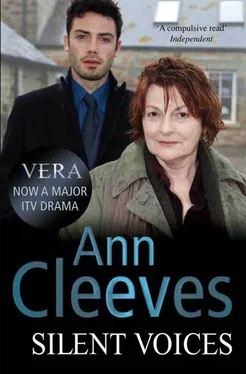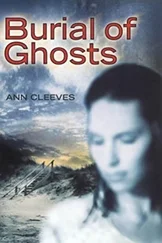‘Can I help you?’ The woman was losing patience. She was confused, Vera could tell. The car Vera was driving was large, new and rather expensive. One of the perks of her rank. Mrs Eliot would consider it the sort of car to be driven by a successful man. Yet Vera was large and shambolic, with bare legs and blotchy skin. She never wore make-up. Vera looked poor.
‘I’m from Northumbria Police. Inspector Stanhope.’ Somewhere at the bottom of her bag there was a warrant card, but best not go there. She might find that bit of bacon sandwich discarded from breakfast yesterday.
‘Oh?’ The woman seemed preoccupied but not scared, which was often the response to an unexpected knock from the police. What have I done? Has there been an accident? Has anything happened to my husband, my daughter or my son? Simon’s mother took in the information and seemed almost excited. Perhaps, after all, she had heard of her neighbour’s murder. Though there was no grief, or pretence of grief.
She held out her hand. ‘Veronica Eliot. Are you here about Connie Masters? She changed her name, but I recognized her at once. I knew there’d be charges brought eventually.’
The name was vaguely familiar to Vera, but she refused to be distracted.
‘I’m here about Jenny Lister.’
The woman frowned. Confused? Disappointed? ‘What about Jenny?’
‘So your son didn’t tell you?’ Then, when the woman shook her head. ‘Look, pet, why don’t you let me come in?’
Veronica Eliot moved aside, then let Vera into a large entrance hall. On the wall facing the door was a painting that drew Vera to stare at it. A small water-colour of stone gateposts with a grassy track curving away between them. Vera thought the track was inviting. You’d want to follow it. But in the painting it didn’t seem to be leading anywhere. On the gateposts were carved birds’ heads. Cormorants, maybe. Long necks and long beaks.
‘Where’s that?’ Vera asked.
‘It’s the entrance to Greenhough, my grandfather’s house,’ the woman said.
‘Very grand.’
‘Not any more. There was a fire in the Thirties. The only thing left now is a boathouse. And those gates.’
Veronica deliberately turned her back on the painting. She led Vera down a cool corridor and into the kitchen. Servants’ quarters , Vera thought. So that’s how she thinks of me. Without being asked, the inspector took a seat at the head of the table. ‘Jenny Lister’s dead. Murdered. That’s why your lad’s run off: to take care of Hannah.’
The woman’s face gave nothing away. Another small frown that expressed distaste rather than shock. Slowly she sat down too. The chairs were pale wood to match the table, upholstered in grey. Expensive and classy enough, if you wanted a kitchen that looked like a businessman’s boardroom. The appliances were all at one end, half a mile away, and were stainless-steel and very big.
‘I see,’ Veronica said at last. ‘One of her clients, I suppose. I’ve really never understood why anyone would choose to become a social worker. Think of the people you have to deal with. Look at Connie Masters.’
That name again. Vera made a note to check it out when she finally got to the office. Social workers had never been her favourite people, but now, in the face of this woman’s attitude, she had an urge to defend Jenny Lister.
She was forming a comment when Veronica spoke again: ‘It’s sad of course, but at least now there’ll be an end to the ridiculous idea of a wedding!’
‘You don’t like Hannah Lister?’ Vera was surprised. She’d taken to the girl immediately, had thought: If I had a son and he’d taken up with a lass like that, I’d be pleased as Punch.
‘Oh, she’s nice enough, but they’re both so young. And I always thought Simon could do better for himself. He’s at Durham. There are some lovely young women at his college.’ She looked wistful.
My God! Vera thought. Hannah’s right. She’s a real old-fashioned snob. I thought the species had died out years ago.
‘And Mrs Lister approved of the engagement, did she? That wasn’t the impression I had from Hannah.’
‘You could never tell with Jenny. Typical social worker. Sitting on the fence. She said she thought they were too young, but I don’t think she did enough to keep them apart. During the holidays Simon practically lives there. Hannah’s still a schoolgirl. Jenny seemed to realize how ridiculous the relationship was, but she still encouraged Simon into the house.’
‘What does your husband make of the relationship?’ Because there must be a husband, Vera thought. Someone to make the money, to keep Veronica in expensive cosmetics and smart new furniture.
‘Oh, Christopher works away a lot. He’s seldom here. He’s only met Hannah a couple of times.’
‘Did Hannah and Simon meet at school?’
‘No. Hannah was at the comprehensive in Hexham.’ Veronica almost sniffed. ‘We sent Simon to the Royal Grammar in town.’
‘That must have cost you a bit.’
Vera made the comment under her breath and Veronica pretended not to hear it. She continued: ‘They met through music. There’s a scheme for young musicians at the Sage. Simon started giving Hannah lifts home after rehearsals. Then there was a music tour of northern Italy and they came back besotted with each other. They’ve been living in each other’s pockets ever since.’
Vera thought of some of the youngsters she came into contact with at work: the druggies and boozers, the thieves and the fighters, the mothers on sink estates sick with worry. She thought Veronica Eliot had little to complain about. ‘Any idea why someone would want to kill Jenny Lister?’ she asked suddenly. Because so far she’d come across nothing near to a motive. Before Veronica could begin another rant about social-services clients, Vera added, ‘She worked with kids apparently, so at the moment we don’t think the murder is work-related. How did she get on with folk in the village? What did people make of her?’
Veronica appeared to consider. ‘We didn’t really mix in the same circles. She probably wasn’t around much. She was at work all day and she had a long commute. I think it’s important to contribute if you live in a small community. You know the sort of thing: parish council, playgroup committee, board of first school governors. I’m on them all.’
It must be nice to have the time. But Vera knew she’d rather stick pins in her eyes than become one of those professional rural committee members.
‘Are you a member of the Willows Health Club?’
If Veronica was surprised by the question she didn’t show it. ‘No,’ she said. ‘Not my sort of place, actually. It was a lovely hotel once, but it’s definitely gone downmarket since the chain took over. I was taken there as a guest when the club first opened, but I found it rather tacky.’ She pursed her lips with distaste. ‘They actually expect members to take their own towels.’
Despite her immediate dislike of the woman, Vera supposed it was over-optimistic to consider that Veronica could be a suspect. The inspector would be delighted to take her to the police station, make her wait with the regulars at the desk and question her in a stinking interview room, but of course Veronica would never strangle anybody. She’d bring them down with her superior looks and supercilious words.
‘Can you point me in the direction of someone who knew her well?’ Vera hoped there was someone outside her immediate family who was sorry Jenny was dead, someone who would drink to her memory and tell stories of the good times they’d shared together.
‘Really, Inspector, I don’t think I can help you. Jenny and I knew each other because our children are friends. We had nothing else in common.’ She stood up and walked out of the kitchen and down the corridor. Vera followed. ‘Of course you could try Connie Masters. I suppose they met through Jenny’s work.’ She gave a little triumphant smile, hesitated at the door in the hope of some response and, when none was forthcoming, she closed it and locked it carefully.
Читать дальше












